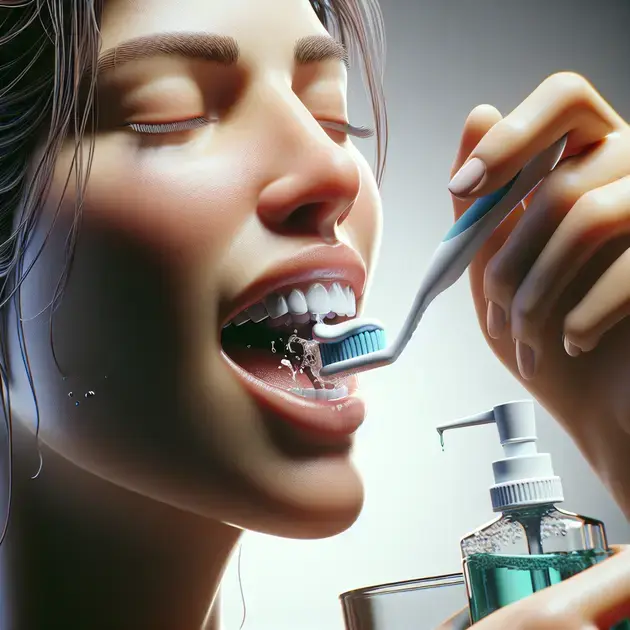Managing bad breath can be a common concern for many individuals, impacting not only their oral health but also their confidence in social interactions. It is essential to understand that bad breath, also known as halitosis, can result from poor oral hygiene practices, underlying health issues, or dietary choices.
By maintaining a proper oral hygiene routine, including brushing twice a day, flossing daily, and using mouthwash, you can significantly reduce the chances of developing bad breath. Additionally, regular visits to the dentist for cleanings and check-ups play a crucial role in preventing oral health problems associated with halitosis.

Preventing Bad Breath with Proper Dental Care
Bad breath, also known as halitosis, can be a source of embarrassment and discomfort for many people. It is often caused by poor oral hygiene practices, such as infrequent brushing and flossing. To prevent bad breath and maintain good oral health, it is essential to follow proper dental care routines.
Step 1: Brush Your Teeth Twice a Day
One of the most basic yet crucial steps in preventing bad breath is to brush your teeth at least twice a day. Use a fluoride toothpaste and brush for at least two minutes each time. Pay attention to all surfaces of your teeth, including the back molars and along the gumline.
Step 2: Floss Daily
In addition to brushing, flossing daily is essential for removing food particles and plaque from between your teeth. Flossing helps prevent the buildup of bacteria that can cause bad breath. Use dental floss or interdental brushes to clean between teeth thoroughly.
Step 3: Clean Your Tongue
The tongue can harbor bacteria and debris that contribute to bad breath. To combat this, use a tongue scraper or your toothbrush to gently clean your tongue surface. This simple step can make a significant difference in keeping your breath fresh.
Step 4: Stay Hydrated
Drinking an adequate amount of water throughout the day is crucial for saliva production, which helps rinse away bacteria in the mouth. Dry mouth can lead to bad breath, so staying hydrated is key to maintaining fresh breath.
Step 5: Schedule Regular Dental Cleanings
Visit your dentist regularly for professional cleanings and check-ups. Your dentist can detect and treat any oral health issues that may be causing bad breath. Professional cleanings also help remove hardened plaque (tartar) that cannot be removed through regular brushing and flossing alone.
The Role of Regular Dental Check-ups in Managing Halitosis
Regular dental check-ups play a vital role in managing halitosis, or chronic bad breath. These routine visits to your dentist are crucial for identifying underlying causes of bad breath and addressing them effectively.
Step 1: Schedule Bi-annual Dental Check-ups
It is recommended to see your dentist at least twice a year for comprehensive dental examinations. During these check-ups, your dentist will assess your oral health, check for signs of gum disease, cavities, and other potential issues that could contribute to halitosis.
Step 2: Discuss Your Concerns with Your Dentist
When you visit your dentist, be sure to communicate any concerns you have about bad breath. Your dentist can conduct a thorough evaluation to determine the underlying cause of your halitosis and develop a personalized treatment plan.
Step 3: Follow Your Dentist’s Recommendations
Based on the findings of your dental check-up, your dentist may recommend specific treatments or adjustments to your oral hygiene routine. It is essential to follow these recommendations diligently to improve and manage your bad breath effectively.
Step 4: Maintain Good Oral Hygiene Habits
In addition to regular dental visits, maintaining proper oral hygiene practices at home is key to managing halitosis. Brushing, flossing, and cleaning your tongue regularly can help prevent the buildup of bacteria that lead to bad breath.
Step 5: Address Underlying Oral Health Issues
If your dentist identifies any underlying oral health issues contributing to your bad breath, such as gum disease or tooth decay, it is crucial to address these issues promptly. Following through with necessary treatments can significantly improve your breath and overall oral health.

Preventing Bad Breath with Proper Dental Care
Bad breath, also known as halitosis, can be an embarrassing condition that affects many individuals. The key to preventing bad breath lies in maintaining proper dental care practices. One of the most crucial steps in ensuring fresh breath is to brush your teeth at least twice a day, preferably after meals. This helps remove food particles that can lead to bacterial growth and odors in the mouth. Additionally, don’t forget to brush your tongue, as bacteria can accumulate on its surface, contributing to bad breath.
Another essential aspect of preventing bad breath is flossing daily. Flossing helps remove plaque and debris from between the teeth, where your toothbrush may not reach. This can significantly reduce the chances of developing bad breath. Alongside brushing and flossing, using an antibacterial mouthwash can further aid in combating bad breath by killing odor-causing bacteria in the mouth.
Regular visits to the dentist are also crucial for maintaining fresh breath. Professional dental cleanings help remove plaque buildup and detect any underlying dental issues that could contribute to halitosis. Your dentist can provide personalized advice on improving your oral hygiene routine and addressing any specific concerns that may be causing bad breath.
In addition to daily oral care practices, staying hydrated by drinking an adequate amount of water throughout the day can help prevent dry mouth, which is a common cause of bad breath. Saliva plays a vital role in washing away food particles and bacteria in the mouth, so staying hydrated can support optimal saliva production.
By following these tips and prioritizing proper dental care, you can effectively prevent bad breath and enjoy a fresh and confident smile.
The Role of Regular Dental Check-ups in Managing Halitosis
Regular dental check-ups play a significant role in managing halitosis, or bad breath, as they allow dentists to assess your oral health and detect any underlying issues that may be contributing to the condition. During a dental check-up, your dentist will conduct a thorough examination of your teeth, gums, and overall oral cavity to identify any signs of decay, gum disease, or other oral health problems.
Early detection of dental issues is crucial in preventing bad breath, as untreated problems can lead to bacterial growth, plaque buildup, and persistent odors in the mouth. Your dentist may also perform professional cleanings to remove stubborn plaque and tartar that regular brushing and flossing may miss, helping to combat bad breath at its source.
Furthermore, dental check-ups provide an opportunity for you to discuss any concerns you may have about bad breath with your dentist. They can offer personalized recommendations for improving your oral hygiene routine, such as using specific mouthwashes or tools to address halitosis effectively.
Aside from addressing existing oral health issues, regular dental visits can also help prevent future problems that could contribute to bad breath. By maintaining a consistent schedule of dental check-ups, you can stay proactive in managing your oral health and promoting fresh breath.
In conclusion, regular dental check-ups are essential for managing halitosis and ensuring optimal oral health. By partnering with your dentist and prioritizing routine visits, you can address bad breath effectively and maintain a healthy and fresh smile.
Holistic Approaches to Eradicating Halitosis
Eradicating halitosis, or bad breath, through holistic approaches involves addressing the root causes of the condition and promoting overall oral and systemic health. One holistic approach to combating bad breath is focusing on a balanced diet rich in fresh fruits and vegetables, as well as limiting sugary and processed foods. Foods high in fiber can help stimulate saliva production, which aids in cleansing the mouth and reducing odor-causing bacteria.
Another holistic method for eradicating bad breath is incorporating natural remedies such as herbal mouthwashes or rinses. Ingredients like tea tree oil, peppermint, and eucalyptus have antibacterial properties that can help freshen breath and combat bacteria in the mouth. These natural remedies can be a gentle yet effective way to address halitosis without harsh chemicals.
In addition to dietary changes and natural remedies, practicing mindfulness and stress-reducing techniques can also contribute to eradicating bad breath holistically. Stress has been linked to oral health issues, including bad breath, so finding ways to relax and unwind can support overall oral health and freshness of breath.
Furthermore, holistic approaches to eradicating halitosis may involve addressing any underlying health conditions that could be contributing to bad breath, such as digestive issues or respiratory problems. By taking a comprehensive and holistic approach to oral care, you can effectively combat bad breath and promote long-term oral health.
By incorporating these holistic practices into your oral care routine and lifestyle, you can work towards eradicating halitosis naturally and maintaining a fresh and healthy smile.
Conclusion
Proper dental care practices are essential in preventing bad breath, also known as halitosis. By brushing your teeth at least twice a day, flossing daily, and using an antibacterial mouthwash, you can combat bacterial growth and odors in the mouth effectively. Regular visits to the dentist play a crucial role in maintaining fresh breath by addressing underlying dental issues and providing personalized advice on oral hygiene routines.
Moreover, staying hydrated throughout the day helps prevent dry mouth, a common cause of bad breath, by supporting optimal saliva production. Dental check-ups are vital in managing halitosis as they allow for early detection of oral health problems, professional cleanings to remove plaque buildup, and discussions with your dentist about personalized solutions for fresh breath.
Embracing holistic approaches like a balanced diet, natural remedies, and stress-reducing techniques can eradicate bad breath naturally by addressing the root causes of the condition. By incorporating these holistic practices into your oral care routine and lifestyle, you can promote long-term oral health and maintain a fresh and confident smile.



